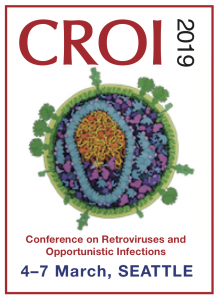Shared housing compared to living alone: higher CD4, lower viral load and reduced inflammation in macaques
12 March 2019. Related: Conference reports, Coinfections and complications, CROI 26 (Retrovirus) 2019.
 Simon Collins, HIV i-Base
Simon Collins, HIV i-Base
The impact of community contact for research animals might have implications for interpreting the results of these studies.
Researchers from Johns Hopkins University in Baltimore looked for health markers of laboratory macaques used for studies. [1]
SIV-negative animals that are kept in single cages have shown significantly higher signs of stress, including lower CD4 counts and other changes in their immune response compared to socially housed animals.
However, animals that were infected with SIV (as models for HIV research) also had significantly higher viral load compared to animals living together.
This was retrospective data from 35 singly housed and 41 socially housed pigtail macaques, with three pre-SIV infection and two post-infection samples during acute infection.
During acute infection, singly housed macaques had a greater drop in CD4 count (p=0.0012), CD8 cells (p=0.0003) and total lymphocytes (p<0.0001), with significantly higher levels of immune activation (circulating activated CD69+ CD4 and CD8+ cells, both p<0.0001).
They also had higher viral loads in plasma and CSF (both p<0.001) throughout acute infection and greater variability in plasma viral load.
This study concluded that this factor might not only affect the interpretation of results from animal studies, but also questioned whether a similar effect might be found in HIV positive people.
Postscript: This paper was later published on 10 May 2021 in JID. [2]
Reference
- Guerrero-Martin S et al. Single housing of macaques increases the immune impact of SIV infection. CROI 2019. Seattle. 4–7 March 2019. Poster abstract 212.
http://www.croiconference.org/sessions/single-housing-macaques-increases-immune-impact-siv-infection (abstract) -
Guerrero-Martin SM et al. Psychosocial Stress Alters the Immune Response and Results in Higher Viral Load During Acute SIV Infection in a Pigtailed Macaque Model of HIV. Journal of Infectious Diseases, jiab252. DOI:10.1093/infdis/jiab252. (10 May 2021).

